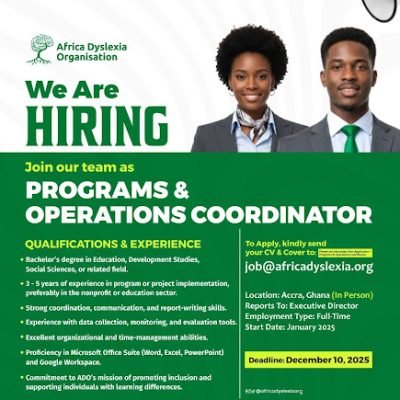Job Title: Programs & Operations Coordinator
Location:Accra, Ghana (In Person)
Reports To:Executive Director
Employment Type: Full-Time
Start Date: January 2026

About Africa Dyslexia Organization (ADO)
The Africa Dyslexia Organization (ADO) is a nonprofit dedicated to promoting awareness, research, and support for individuals with dyslexia and related learning differences across Africa. We work to ensure inclusive education, influence policy, and provide practical resources for teachers, parents, and learners. Our mission is to create a society where every individual with dyslexia is empowered to thrive.
1. Role Summary
The Programs & Operations Coordinator serves as the strategic and operational lead for ADO’s programme portfolio. This role drives programme design, implementation, quality assurance, and organizational efficiency across all ADO initiatives, including teacher training, fellowships, advocacy campaigns, conferences, research projects, and community engagements.
The Coordinator will conceptualize, develop, and scale new programs that advance ADO’s mission to transform learning outcomes for children with dyslexia and other learning differences across Africa. This includes ensuring operational excellence, strong stakeholder engagement, and robust monitoring and reporting systems.
This position is ideal for a proactive, highly organized, strategic thinker with strong experience in programme leadership, nonprofit operations, and inclusive education or child development.
2. Key Responsibilities
A. Strategic Programme Leadership (35%)
- Lead the development, planning, and implementation of ADO’s programme strategy.
- Design new high-impact programs and initiatives aligned with ADO’s multi-year strategy (teacher training, screening, technology, advocacy, fellowships, research).
- Translate strategic goals into annual workplans, timelines, budgets, and execution frameworks.
- Conduct needs assessments and landscape analyses to inform programme design and innovation.
- Identify opportunities for programme diversification, scale-up, and cross-country expansion.
B. Programme Management & Quality Assurance (30%)
- Oversee the implementation of all programme activities, ensuring quality, relevance, and effectiveness.
- Supervise program officers, facilitators, trainers, and consultants.
- Develop and enforce standard operating procedures (SOPs), programme tools, and implementation guidelines.
- Ensure safety, safeguarding, and operational compliance across all activities.
- Troubleshoot programme bottlenecks and ensure timely delivery of outputs and milestones.
C. Operations & Organizational Systems (20%)
- Strengthen ADO’s operational systems including procurement, logistics, HR processes, and administration.
- Ensure effective scheduling, workflow coordination, and resource planning for all programme teams.
- Lead operational planning for major events, such as the Africa Dyslexia Conference, teacher trainings, workshops, and media engagements.
- Maintain efficient document management, shared drives, and digital workflows.
- Coordinate recruitment, onboarding, and management of program staff, interns, ambassadors, and volunteers.
D. Stakeholder Engagement & Partnerships (10%)
- Cultivate and manage relationships with government partners, schools, NGOs, donors, academic institutions, and international agencies (UNESCO, UNICEF, etc.).
- Represent ADO in stakeholder meetings, events, and technical working groups.
- Support proposal development by contributing to program design inputs, budgets, and technical content.
- Collaborate with the Partnerships & Advancement team to strengthen programme visibility and funder reports.
E. Monitoring, Evaluation & Learning (5%)
- Oversee MEAL systems for programme data collection, analysis, and reporting.
- Ensure accurate documentation, quarterly reporting, and donor compliance.
- Integrate learning insights into program improvements and strategic decisions.
- Produce progress reports, program briefs, and presentations for senior management and donors.
3. Required Qualifications & Experience
- Bachelor’s degree in Education, Development Studies, Social Sciences, Public Policy, or a related field (Master’s preferred).
- 3–5 years of programme leadership and operations experience in a nonprofit, education, or development setting.
- Demonstrated experience designing and managing large multi-stakeholder programs.
- Strong knowledge of inclusive education, foundational literacy, disability inclusion, or willingness to learn rapidly.
- Experience leading teams and managing complex workflows.
- Proven ability to build partnerships with government institutions, donors, and international organizations.
4. Skills & Competencies
- Strong strategic planning, program design, and operational management skills.
- Excellent communication skills (written, verbal, presentation).
- High competency in project management, budgeting, and reporting.
- Advanced proficiency in MS Office, Google Workspace, and project management tools.
- Strong interpersonal, leadership, and stakeholder engagement abilities.
- High attention to detail, reliability, and commitment to high-quality results.
- Ability to multitask in a fast-paced, mission-driven environment.
5. Personal Attributes
- Passionate about education, child development, and disability inclusion.
- Innovative thinker with strong execution discipline.
- Proactive and solutions-oriented with a growth mindset.
- High integrity, emotional intelligence, and professionalism.
- Team-oriented with the ability to inspire collaboration.
6. Remuneration
ADO provides a competitive salary and benefits package, with opportunities for ongoing professional development, and participation in global networks.
How to Apply
Interested candidates should send their CV and a cover letter (highlighting relevant experience and motivation for the role) to job@africadyslexia.org by December 10, 2025, at the latest. Please use the subject line: Application – Programs & Operations Coordinator.
Only shortlisted candidates will be contacted. The Africa Dyslexia Organization is an equal opportunity employer and does not discriminate based on gender, age, disability, religion, ethnicity, or any other status. We are committed to building a workplace that values diversity, equity, and inclusion.
